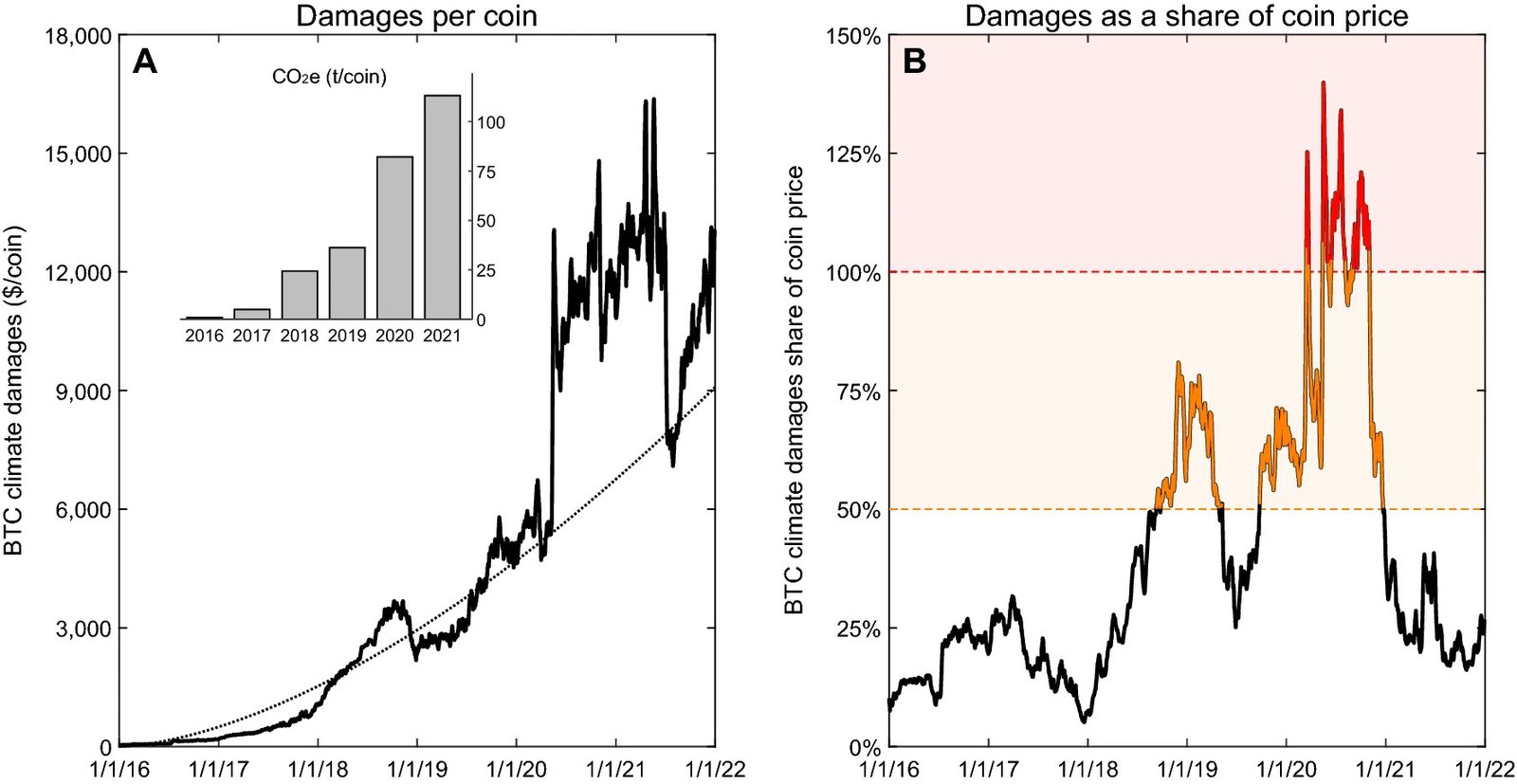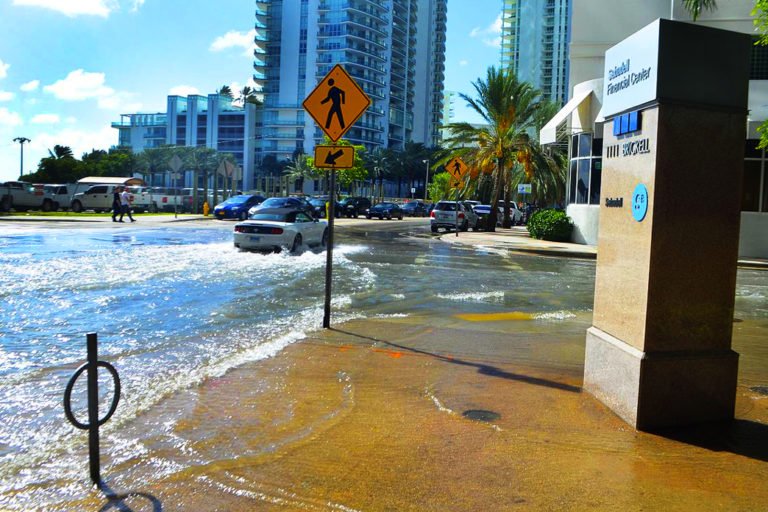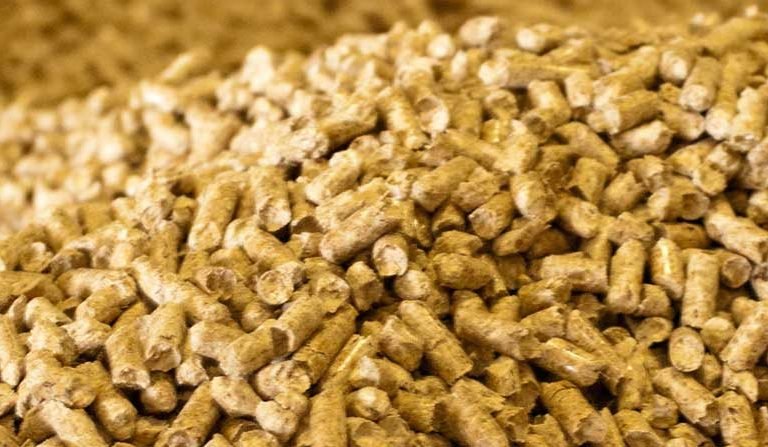- The negative climate impacts of mining the cryptocurrency Bitcoin have grown rapidly over time, with carbon emissions per coin multiplying 126 times from 2016 to 2021.
- During that window, the climate damage of mining one Bitcoin averaged 35% of a coin’s value, similar to the environmental costs of unsustainable products like crude oil and beef.
- Reducing Bitcoin’s massive carbon footprint may require international regulation unless the cryptocurrency shifts to a more energy-efficient mining system.
With no physical form, the digital currency Bitcoin can feel all but invisible to those who don’t use it. However, its harmful climate impacts are all too real – and they’re getting worse.
Emissions from mining the cryptocurrency have skyrocketed, researchers reported recently in Scientific Reports. From 2016 to 2021, the carbon footprint of mining a single Bitcoin multiplied a staggering 126 times. In that window, Bitcoin mining caused an estimated $12 billion in global climate damages.
“We find no evidence that Bitcoin mining is becoming more sustainable over time,” said economist Benjamin Jones of the University of New Mexico in a statement. “Rather, our results suggest the opposite: Bitcoin mining is becoming dirtier and more damaging to the climate.” (Jones and his two coauthors declined interview requests from Mongabay.)
When someone buys or trades Bitcoin, computers in the network compete to solve a complex numerical puzzle. The winning computer then validates the transaction, earning its owner new Bitcoin. This process is called “mining.”
The computing power needed to mine Bitcoin, by far the world’s largest cryptocurrency by value, comes at a cost. Bitcoin in 2020 used 75.4 terawatt-hours of electricity — more than the country of Austria. Most of that electricity comes from burning fossil fuels like coal and natural gas, the researchers said.
To estimate the resulting climate impacts, Jones and his team analyzed how Bitcoin’s electricity demand fluctuated from 2016 to 2021. Based on where miners operate and how those places produce electricity, they found, mining a coin in 2021 emitted 113 metric tons (111.2 imperial tons) of carbon dioxide on average, up from just 0.9 metric tons in 2016. Assuming each metric ton of carbon dioxide causes $100 of environmental damage — a figure similar to those used by other researchers — then each Bitcoin mined in 2021 dealt over $11,300 of climate damages.

The trend arises from Bitcoin’s competitive “proof-of-work” mining system, the researchers said. As more miners join the fray and use more powerful computers to compete, electricity usage shoots up. And to keep those miners from generating new Bitcoin too quickly and lowering its value, an algorithm raises the difficulty of the mining puzzles, demanding more electricity to solve them as time goes on.
Experts expect climate damages to continue as long as dirty fuels like coal remain cheap, especially given recent drops in Bitcoin’s value. The cryptocurrency fell from an all-time high of almost $69,000 per coin in November 2021 to just over $16,500 per coin a year later.
“Miners will start going from renewable energy to dirty energy, to coal power, just to increase their profit margin,” said finance professor Larisa Yarovaya at the University of Southampton, U.K., who was not involved in the study.

Between 2016 and 2021, offsetting the climate damages of mining a Bitcoin would have cost 35% of that coin’s value, on average. By this standard, Bitcoin ranks alongside unsustainable products like crude oil and beef.
Judging Bitcoin’s climate damages in terms of its value, however, may not be the most reliable strategy.
“This is such a speculative asset,” said Giovanni Compiani, a professor of marketing at the University of Chicago who was not involved in the study. Bitcoin’s value, Compiani said, swings dramatically and doesn’t always reflect the coin’s actual usefulness — but mining it always generates emissions.
Cryptocurrency doesn’t have to be so damaging, the authors noted. Ethereum, the second-largest crypto network, recently adopted a “proof-of-stake” system that randomly selects participants to process transactions. In contrast to Bitcoin’s system, this approach eliminates competition between miners, reducing the number of computers at work at any given time. The move makes Ethereum less secure but will likely cut its energy use by over 99.9%.

Switching to proof-of-stake would involve moving Bitcoin’s blockchain, the digital ledger documenting all transactions, to a different system. The crypto giant has no incentive to attempt such an onerous engineering feat, Yarovaya said.
That leaves regulation. But when China banned cryptocurrency last year, many miners there moved to the U.S. and Kazakhstan — where they sourced a greater portion of their electricity from gas and coal power.
“If there’s just a shift in the activities from one country to the other, then this doesn’t really solve the problem,” said Compiani. “Ultimately, the emissions are global.” Creating a climate-friendly crypto culture, he said, will require international coordination.
Citation:
- Jones, B. A., Goodkind, A. L., & Berrens, R. P. (2022). Economic estimation of Bitcoin mining’s climate damages demonstrates closer resemblance to digital crude than digital gold. Scientific Reports, 12(1), 1-10. doi:10.1038/s41598-022-18686-8
Sean Cummings (@SciNonficSean) is a graduate student in the Science Communication Program at the University of California, Santa Cruz. Other Mongabay stories produced by UCSC students can be found here.












